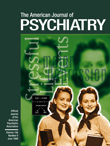Previous Exposure to Trauma and PTSD Effects of Subsequent Trauma: Results From the Detroit Area Survey of Trauma
Abstract
OBJECTIVE: With the exception of a few reports of higher rates of childhood trauma in Vietnam veterans with posttraumatic stress disorder (PTSD), little is known about the influence of previous exposure to trauma on the PTSD effects of subsequent trauma. The authors examine interrelated questions about the effects of previous exposure to trauma. METHOD: A representative sample of 2,181 individuals in southeast Michigan were interviewed by telephone to record lifetime history of traumatic events specified in DSM-IV as potentially leading to PTSD. PTSD was assessed with respect to a randomly selected index trauma from the list of events reported by each respondent. RESULTS: History of any previous exposure to traumatic events was associated with a greater risk of PTSD from the index trauma. Multiple previous events had a stronger effect than a single previous event. The effect of previous assaultive violence persisted over time with little change. When they examined several features of the previous exposure to trauma, the authors found that subjects who experienced multiple events involving assaultive violence in childhood were more likely to experience PTSD from trauma in adulthood. Furthermore, previous events involving assaultive violence—single or multiple, in childhood or later on—were associated with a higher risk of PTSD in adulthood. CONCLUSIONS: Previous exposure to trauma signals a greater risk of PTSD from subsequent trauma. Although these results are consistent with a sensitization hypothesis, like the results from previous research on PTSD, they do not address the mechanism of increased responsivity to trauma. Long-term observational studies can further elucidate these observations.



